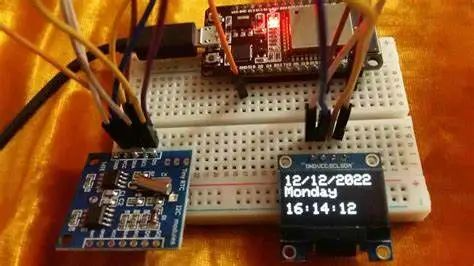In the development of ESP32 projects, time management is crucial. It allows you to precisely control program execution, complete scheduled tasks, log data, and even implement complex timing functions. The ESP32Time library has emerged to provide a series of convenient APIs, enabling developers to easily retrieve and set the time of the ESP32’s internal RTC, making time management simple and efficient.

The Core Features of ESP32Time
The main features of the ESP32Time library are:
1. Get and Set Time:
-
•
setTime(year, month, day, hour, minute, second): Sets the time of the ESP32’s internal RTC. -
•
setTime(epoch): Sets the time of the ESP32’s internal RTC using a Unix timestamp (the number of seconds since January 1, 1970, 00:00:00 UTC). -
•
setTimeStruct(time): Sets the time of the ESP32’s internal RTC using a time structure. -
•
getTime(): Retrieves the current time (string format, e.g., “15:24:38”). -
•
getDate(): Retrieves the current date (string format, e.g., “Sun, Jan 17 2021”). -
•
getDateTime(): Retrieves the current date and time (string format, e.g., “Sun, Jan 17 2021 15:24:38”).
2. Get Time Components:
-
•
getSecond(): Retrieves the current second. -
•
getMinute(): Retrieves the current minute. -
•
getHour(): Retrieves the current hour (12-hour format). -
•
getHour(true): Retrieves the current hour (24-hour format). -
•
getDay(): Retrieves the current day. -
•
getMonth(): Retrieves the current month. -
•
getYear(): Retrieves the current year.
3. Other Time-Related Functions:
-
•
getMicros(): Retrieves the current microsecond count. -
•
getMillis(): Retrieves the current millisecond count. -
•
getEpoch(): Retrieves the current Unix timestamp. -
•
getLocalEpoch(): Retrieves the current Unix timestamp (without timezone offset). -
•
getDayofWeek(): Retrieves the current day of the week. -
•
getDayofYear(): Retrieves the current day of the year.
4. Time Formatting:
-
•
getTime("%A, %B %d %Y %H:%M:%S"): Formats time information into a string using the specified format string.

Advantages of ESP32Time
-
• Easy to Use: ESP32Time provides a simple and intuitive API, allowing developers to easily retrieve and set the time of the ESP32’s internal RTC.
-
• Powerful Functionality: ESP32Time offers a rich set of functions to meet various time management needs.
-
• Superior Performance: The ESP32Time library code is optimized for stable performance, effectively handling time-related tasks.
-
• Flexible Expansion: The ESP32Time library supports custom time formatting to meet the needs of various application scenarios.
How to Use ESP32Time
1. Install the ESP32Time Library:
-
• Using Arduino IDE: In the Arduino IDE, click “Sketch” -> “Include Library” -> “Manage Libraries…”, search for “ESP32Time” and install it.
-
• Using PlatformIO: In the PlatformIO project, add the following content to the
platformio.inifile:
[env:esp32dev]
platform = espressif32
board = esp32dev
framework = arduino
lib_deps = ESP32Time2. Using the ESP32Time Library:
#include <ESP32Time.h>
ESP32Time rtc; // Create an instance of ESP32Time
void setup() {
Serial.begin(115200);
rtc.setTime(2023, 12, 25, 12, 0, 0); // Set time
}
void loop() {
Serial.print("Current time: ");
Serial.println(rtc.getDateTime()); // Get current date and time
delay(1000);
}Application Scenarios of ESP32Time
The ESP32Time library has a wide range of applications in ESP32 projects, such as:
-
• Scheduled Tasks: Using the
millis()function andgetMillis()function, you can implement scheduled tasks, such as sending data at intervals or controlling devices at specific times. -
• Logging: Using the
getDateTime()function, you can log time information to a log file, making it easy to track program execution status. -
• Timer: Using the
getMillis()function, you can implement a simple timer, such as recording runtime or measuring reaction time. -
• Clock Display: Using the
getDateTime()function, you can display the current date and time on an LCD or OLED screen. -
• Alarm Functionality: Using the
getDateTime()function anddelay()function, you can implement alarm functionality to remind users to perform specific tasks.
Conclusion
The ESP32Time library provides a powerful time management tool for ESP32 project development, helping developers easily retrieve and set time, and implement various time-related functions. Whether for simple scheduled tasks or complex timing applications, ESP32Time can meet your needs.
Project Address: https://github.com/fbiego/ESP32Time